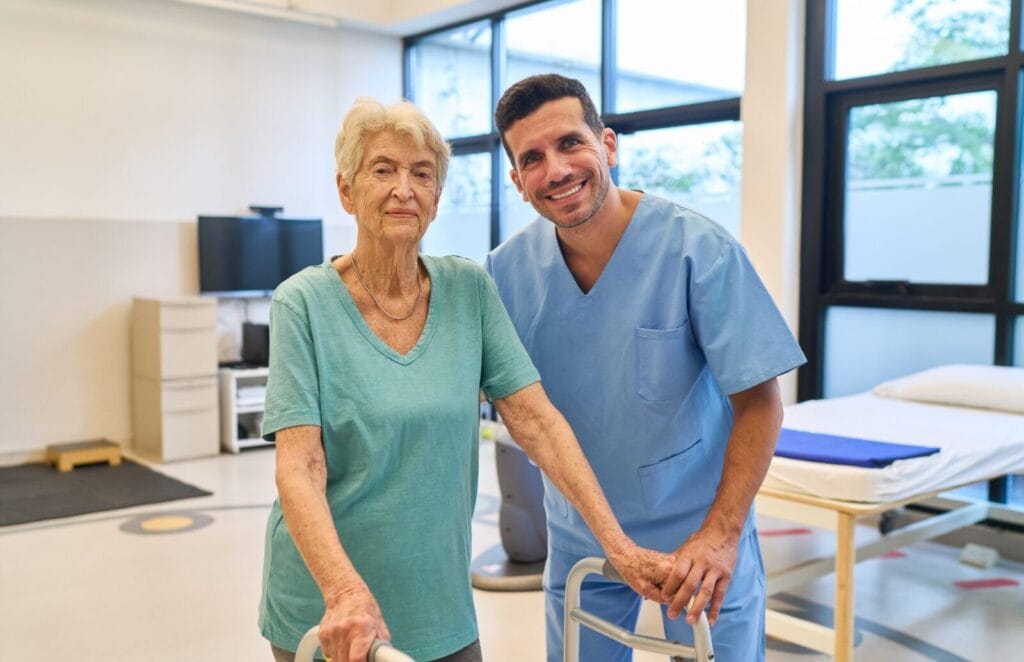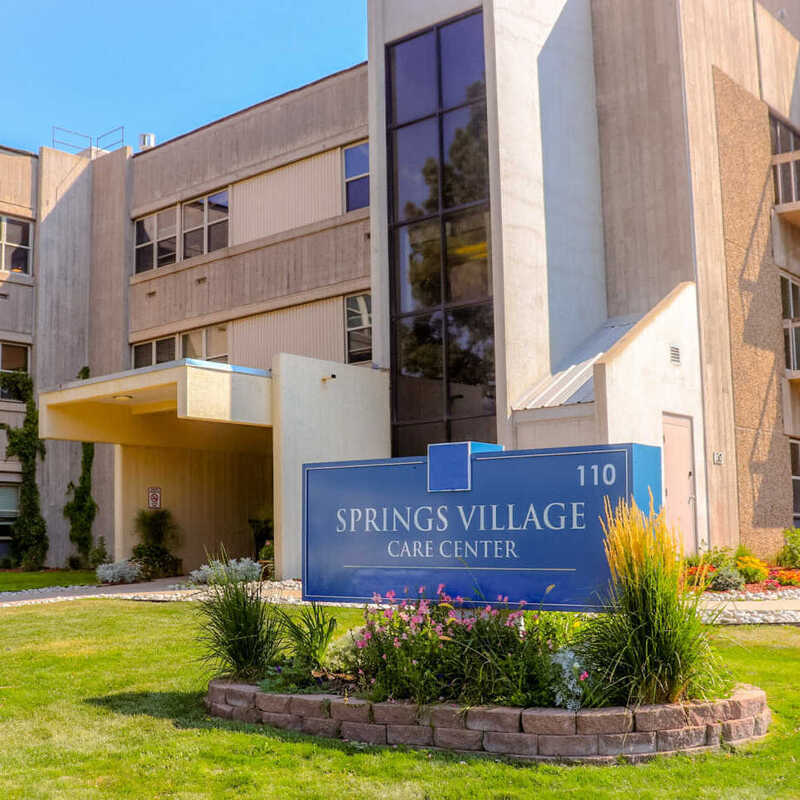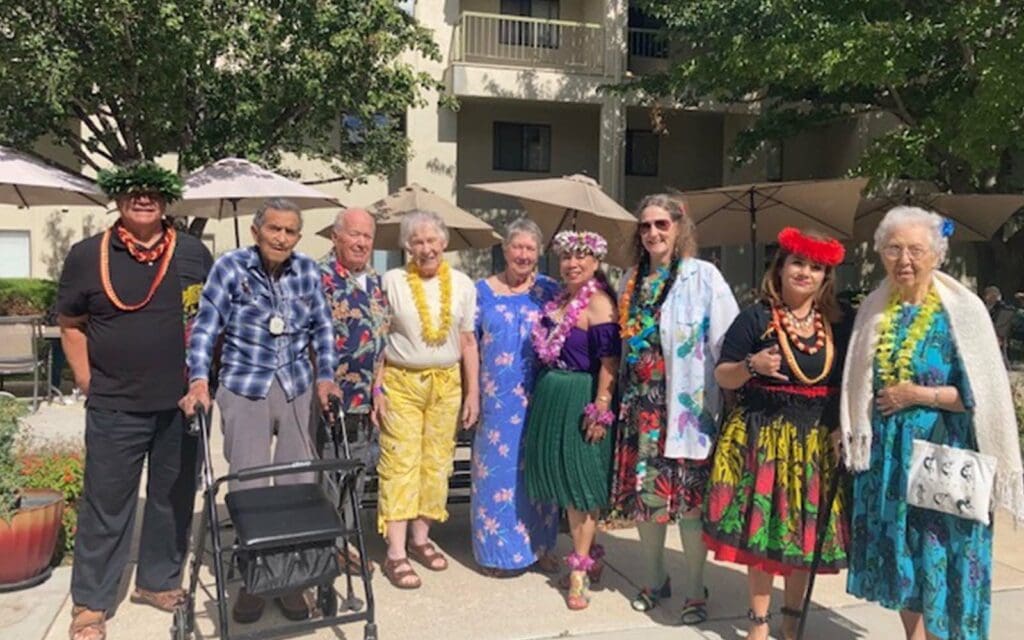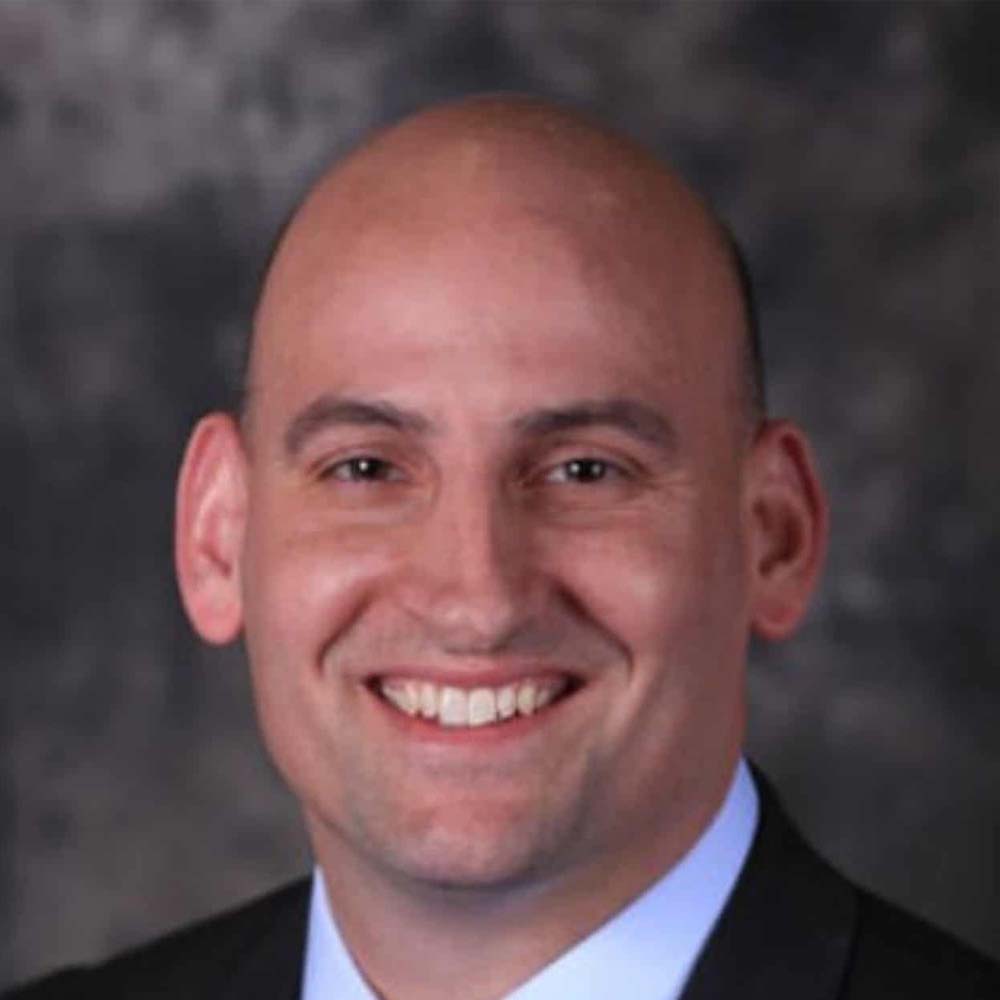The Ultimate Guide To Skilled Nursing & Rehab Care
When your senior loved one needs full-time skilled nursing care and rehab, things can feel very overwhelming. You want them to get the best possible care, but serious medical needs that require care around the clock can be very difficult to manage. It’s next to impossible to provide medical care yourself, so it feels like you’re left with few options.
Thankfully, skilled nursing and rehab care is a great solution for many seniors. These specialized senior living communities provide advanced medical care and rehabilitation for individuals with significant needs, while also offering a secure environment, meals, housekeeping, and social and recreational activities. Whether you’re just starting to explore your options or need to make a decision soon, we hope this Ultimate Guide will help every step of the way.
This comprehensive guide is designed to help you decide whether a skilled nursing & rehab community is the best choice for you or your loved one. We’ll also share the pros and cons of these communities, the cost and payment options, and finally, the process of choosing the right community. Read on for all the information you’ll need to make an informed decision.
What is A Skilled Nursing & Rehab Community?
Skilled nursing and rehab communities, also called skilled nursing facilities (SNFs), provide specialized residential care and rehabilitation for people with significant health needs. In the past you may have heard these described as “nursing homes” or “old folks’ homes.” However, the right skilled nursing care should feel like home, not a hospital. These communities typically employ nurses, certified nursing assistants, physical and occupational therapists, doctors, dietitians, and more medical professionals. Staff members provide medical care, like medication management, monitoring of blood pressure, blood sugar, and other vital signs, and treatment of injuries. They also coordinate care with doctors about any new issues or symptoms.
Rehabilitation (rehab) services at a skilled nursing community provide physical, occupational, and speech therapy to help restore physical function and skills after a stroke, traumatic brain injury, serious illness, or accident. Trained rehab professionals will help you or your loved one with mobility, strength, and independence using exercises, stretches, and adaptive equipment.
Seniors also get help with daily activities such as bathing, eating, mobility, toileting, and dressing. Typically, this type of community also offers dietitian-approved, chef-prepared meals, social and recreational activities, and personalized care and therapies. If necessary, residents may receive 24/7 supervision as well.
You can live in a skilled nursing & rehab community either temporarily (as a short-term stay) or on a full-time basis. If your loved one is recovering from a recent illness, injury, or surgery, they may stay temporarily in skilled nursing care after being released from the hospital. Once they have made a full recovery, they can return home (or to their independent living or assisted living community). If you or your loved one needs care due to a chronic or progressive condition, they can stay permanently, unless hospice care is later required.

Skilled nursing care is vital, compassionate work.
Skilled Nursing vs Rehab: What’s the Difference?
There are so many senior living terms that it can be hard to keep them all straight. You may be wondering, is skilled nursing the same as rehab? Here’s the difference between skilled nursing and rehab care.
Skilled nursing care usually includes intensive, long-term medical care, while rehab is intended to regain physical function after an injury, accident, surgery, or illness. Rehab is typically limited to physical, occupational, and/or speech therapy. It’s also usually a short-term care plan. Skilled nursing care includes IV therapy, wound care, injections, medication, and other types of advanced medical care provided by medical professionals. It’s usually longer-term and intended for managing chronic and progressive medical conditions.
The main difference is the focus and level of medical care. Rehab provides short-term therapy with the goal of returning home or completing treatment. Skilled nursing facilities provide a more advanced level of comprehensive medical care that may be short- or long-term. Many skilled nursing communities provide in-house rehab care. Private rehab centers typically don’t offer medical care beyond physical, occupational, and speech therapy.

Rehab care can happen within skilled nursing communities, hospitals, or in a private clinic.
How To Know When It’s Time for Skilled Nursing & Rehab Care
What qualifies a patient for skilled nursing care? Some signs that it may be time to consider skilled nursing and/or rehab care include:
- Frequent or severe falls or injuries
- Intensive medical needs or specialized treatments, like a feeding tube, IV therapy, or wound care
- Recent or frequent hospitalization due to surgery, illness, or injury
- Trouble managing medications (like remembering to take them, taking them on time, correct dosage, etc)
- Living alone feels unsafe
- Inability to manage daily tasks like eating, dressing, and bathing
- Not able to move well, drive safely, or manage public transportation
- Diagnosis of chronic and/or progressive medical conditions, like heart disease, respiratory issues, or diabetes
- Recent stroke, cardiac event, traumatic brain injury, or other significant medical issue
- Need for constant, around-the-clock medical care or supervision
- Medical care needed by trained professionals, beyond the ability of caregivers
- Need for physical therapy, occupational therapy, or speech therapy
- Lack of mobility and need for help walking, eating and/or transferring to the toilet

A nurse checks vitals on a skilled nursing resident
Pros & Cons of Skilled Nursing & Rehab Care Communities
People usually turn to skilled nursing & rehab care when it is medically necessary, and there often aren’t a lot of other choices. However, there are still pros and cons, as well as a variety of care options. Here are some of the benefits and disadvantages of this type of community:
Pros
- Skilled nursing and rehab communities often provide extra safety features, including secured exits, monitored entrances, and easy-to-navigate layouts.
- These communities offer extensive, around-the-clock help with daily activities such as bathing, dressing, and grooming.
- They also provide nutritious meals and housekeeping services.
- These communities employ nurses, certified nursing assistants, physical and occupational therapists, dieticians, and other healthcare professionals to provide top-tier medical care.
- Communities offer social and recreational activities, which can help to combat isolation and loneliness.
- They can provide a higher quality of life for seniors with serious and/or progressive health conditions.
- They can also offer a sense of community and belonging.
- The type of care skilled nursing and rehab communities provide cannot be provided at home.
- These communities reduce the stress and burden on caregivers, and provide peace of mind for families.
- They also often include special support for family members.
- They provide the most care you can receive outside of a hospital.
- Unlike other types of senior living communities, they can accommodate individuals with severe health issues or disabilities.
Cons
- Skilled nursing care can be expensive, though there are a variety of ways to make it more affordable.
- There is less privacy in a senior living community than you’d experience in a single family home.
- A team of in-home care providers can sometimes provide more individualized care, which may be preferable for older adults that can afford that option.
- Moving someone with severe health issues or disabilities to a new and unfamiliar environment can be stressful, and requires a period of adjustment.
- Not all communities can provide sufficient end-of-life care, which may require moving to hospice.

The best nurses treat community members like family.
Skilled Nursing and Rehab Care Versus Other Types of Senior Care
There are a variety of care options available for people who are recovering from a hospital stay or who have significant health issues or disabilities. Skilled nursing communities are one option, but they may not be the right fit for everyone at every stage. In this section, we’ll explore how this type of care compares to other types of senior care, including independent living, assisted living, memory care communities, home care, and respite care. By understanding the similarities and differences between skilled nursing and other types of senior care, you’ll be better equipped to make an informed decision about the best type of care for you or your loved one.
Skilled Nursing & Rehab Communities vs Home Care
Instead of living in any type of senior living community, you can receive home care, where service providers come to your home to provide whatever assistance you need. This may include home healthcare providers, housekeepers, transportation services, lawn care, and more. Just like it sounds, home care is provided at home. For a disabled person, someone with extensive medical needs, or someone who is recovering from surgery, injury, or serious illness, home care often requires multiple caregivers to provide around-the-clock daily care and supervision.
Skilled nursing communities are a residential care option where individuals live in a specialized community setting and receive daily medical care and treatment, as well as 24/7 assistance with daily activities by staff at the community. For seniors looking for extensive medical care, around-the-clock help, safety, security, and community, these communities are often the preferred choice.
Skilled Nursing & Rehab Care vs Independent Living
Independent living is a type of senior housing where older adults live in apartments, condominiums, or single-family homes within a community of older adults, but don’t receive assistance with activities of daily living. They also don’t receive medical care, or any care provided by healthcare providers. Independent living may be appropriate for people in the early stages of some progressive illnesses and people without serious health conditions.
Skilled nursing care, on the other hand, provides advanced medical care and treatment, assistance with daily tasks, and meals, housekeeping, medication management and social and recreational activities. It’s typically necessary for people with serious healthcare needs.
Skilled Nursing & Rehab Care vs Assisted Living
Assisted living communities provide assistance with activities of daily living, but do not provide specialized or advanced medical care. They often provide medication management, but usually won’t provide IV therapies, injections, or wound care. They also may not have 24/7 supervision or extra security measures.
Skilled nursing care is designed to give people with significant health needs advanced medical care. These communities provide a much higher level of care and security than traditional assisted living communities. They also provide daily access to licensed healthcare professionals, including nurses, certified nursing assistants, physicians, dieticians, and more. These professionals provide diagnosis, treatment, and therapies as needed.
Rehab, or rehabilitation, is a type of care program usually performed by physical, occupational, and/or speech therapists. It is intended to help you regain skills, abilities, strength, and mobility following an accident, illness, surgery, or injury. Most skilled nursing communities offer rehab. Assisted living communities also sometimes offer rehab care.
Skilled Nursing & Rehab Care vs Memory Care Communities
Memory care communities focus on treatment and management of memory loss disorders. They also provide 24/7 supervision and a higher level of security for their residents than other senior living communities. However, they do not provide the same level of medical care as a skilled nursing community, and they usually don’t provide rehabilitation. They are staffed mainly by caregivers rather than licensed medical professionals, though they will often have nurses available and doctors on-call.
Skilled nursing communities, sometimes called “nursing homes” or “skilled nursing facilities,” provide a higher level of medical care than memory care communities. They are typically staffed by licensed medical professionals in a more clinical (but still home-like) setting. These types of communities provide the most care you can receive outside of a hospital. They also usually have rehab care available.
Skilled Nursing Care vs Respite Care
Respite care, sometimes called “adult daycare”, is a temporary form of care that is provided to give primary caregivers a break. Respite care can be provided in a variety of settings, including assisted living communities, skilled nursing communities, memory care communities, or in-home care. This is a great option for caregivers who want to provide in-home care for their loved ones by home healthcare and other service providers, but need someone qualified to take care of them during the workday or during trips and vacations. Respite care can also refer to a short-term stay at a senior living community, like a period of days or weeks. Not all skilled nursing communities offer respite care or short-term stays, though many do.

Budgeting for skilled nursing care is helpful, but it might be more affordable than you think.
How Much Does Skilled Nursing & Rehab Care Cost?
The million dollar question: how much does skilled nursing & rehab care actually cost?
Because of the higher level of care and security offered, and advanced medical care provided, skilled nursing care is not inexpensive. However, unlike other types of senior living communities, skilled nursing care is often eligible for Medicare and Medicaid, and it is tax deductible.
The median cost for a private room in a skilled nursing community in 2024 is $330 per day, which adds up to an average of $9,000- $10,000 per month (1, 2). It varies widely depending on your location, length of stay, level of care needed, insurance, and the amenities provided at the community. At Stellar Living, we provide transparent line-item pricing for our communities. Just call our Family Advisors today to find out how much a Stellar Living Community will cost in your area.
In this section, we’ll take a closer look at what’s included in this cost and the factors that can affect it. We’ll also explore various payment options, such as long-term care insurance, Medicaid, veterans benefits, and more.
What’s included in this cost?
The cost of skilled nursing care varies depending on the location, type of community, and level of care needed. For Stellar Living Communities, this cost includes specialized medical care, access to a wide range of healthcare professionals, and room and board, as well as assistance with daily activities such as bathing, dressing, grooming, and medication management. The “room and board” cost of Stellar Living Communities also includes chef-prepared meals, housekeeping, transportation, use of gyms, libraries, computer rooms and other on-site amenities, and social and recreational activities both on- and off-site.
Does Health Insurance Cover Skilled Nursing & Rehab Care?
Health insurance coverage varies depending on the type of insurance and the individual’s policy. Health insurance does not usually include the room-and-board costs of any community. However, health insurance typically does cover medical costs related to injuries or serious illnesses or health conditions. This might include rehab, medications, physical or occupational therapies, and doctor’s appointments. If custodial full-time skilled nursing care is considered medically necessary, health insurance may cover some of the cost. However, even if private health insurance does cover it, they typically only cover short-term stays. Long-term care insurance, Medicaid, and veterans benefits may also cover some or all of the cost.
What about Medicare or Medicaid?
Medicare does not cover the room and board cost of any senior living communities or long-term care. However, they will cover the cost of skilled nursing & rehab care in some situations. For example, they’ll provide coverage if:
- You have recently had a medically necessary hospital stay, typically of at least 3 days.
- Your doctor or other health care provider has decided that you need daily skilled care (like intravenous fluids/medications or physical therapy) that must be administered by a healthcare professional.
- You need skilled services or rehabilitation due to a new or ongoing health condition.
Typically, all of these conditions must be met for Medicare Part A participants to be covered.
Unfortunately, even when Medicare covers full-time care, it will only cover a short-term stay. Medicare will cover 100% of the cost of days 1-20 in a skilled nursing community. After that, you will pay $204 each day until you hit 100 days. Medicare does not provide any coverage beyond 100 days.
Medicaid does cover long-term care in an approved Medicaid Nursing Facility for those who qualify (source). It should be noted that not all communities are approved by Medicaid or accept Medicaid as payment. Talk to your local communities about Medicaid payment options.
Are there Veterans Benefits for Skilled Nursing & Rehab Care?
VA benefits are available for veterans who have VA healthcare. VA Healthcare does usually cover skilled nursing care and rehabilitation for those who require it. Find out more here.
Who qualifies for VA benefits?
You can get VA benefits if:
- You’re signed up for VA health care, and
- They conclude that you need skilled nursing and rehab care to help with your ongoing treatment and personal care, and
- There is an approved community near you.
They may also consider other factors, like your service-connected disability status or insurance coverage.
How do I apply for veteran benefits?
To apply for veteran benefits, veterans should contact the Department of Veterans Affairs or a veterans’ service organization for more information.
Is it tax deductible?
Yes, skilled nursing care is tax-deductible. If you or your loved one is staying at a community primarily for medical care, the entire expense is deductible as a medical expense. Find out more here.
More Ways To Pay for Skilled Nursing & Rehab Care
Life Insurance
You may be able to use your life insurance benefits to cover the costs of skilled nursing & rehab care and other long-term care needs. When you do this, you get a percentage of the value of your life insurance policy to pay for medical costs. Typically, you’ll get about 20%-50% of the face value of your policy. However, using this feature will close out your life insurance policy, so any beneficiaries won’t receive any money. It’s a good option to consider if you don’t have a spouse and/or children, or your children are grown and your spouse is already financially stable.
Additionally, many life insurance policies also offer hybrid policies or riders that allow you to access some of your death benefit early in order to pay for medical expenses or other emergency costs. Contact your life insurance provider to learn more about these options.
Long-Term Care Insurance
Long-term care insurance is a great option. You can purchase a long-term care insurance policy in addition to your health insurance plan to prepare for any future care. Most policies will cover skilled nursing and rehab, as well as assisted living, memory care, physical and occupational therapy, and respite care. Be sure to check the details and exclusions of your policy to be sure your community will be covered. Some policies will cover you for the rest of your life, while others might only cover as little as two years. It may also be more difficult to get this type of insurance if you are over the age of 70. Get this coverage sooner rather than later, because it is likely to be less expensive in the long term.

Springs Village Care Center in Colorado Springs
How To Choose a Skilled Nursing & Rehab Community
Choosing the right community for you or your loved one can be a daunting task. There are many factors to consider, from the specific therapies and treatments offered, to the staff-to-resident ratio, to the cost. In this section, we’ll help you choose the best community for you or your loved one. We’ll cover the top 10 questions to ask when visiting a community, as well as other important factors to consider.
Top 10 questions to ask when visiting a community
- What levels of care and services do you offer? Do you offer rehab care?
- What treatments and therapies are available for my or my loved one’s specific healthcare needs?
- What is your base monthly price? Are there any additional costs or fees that I should be aware of?
- What is the process for transitioning to hospice care, if necessary?
- What processes does the community have in place to handle emergencies?
- How do you manage medication, rehabilitation, and other healthcare needs?
- What kind of recreational and social activities do you offer?
- What is your visitor policy?
- Who do I contact if I have complaints or concerns?
- Can I see references or testimonials from current or former residents?
It’s important to visit several communities and ask these and any other questions in order to find the best fit for you or your loved one. Don’t be afraid to explore the communities and really get a feel for what it would be like to live there. Want to tour a skilled nursing or rehab community? Find a Stellar Community near you today. Stellar Living offers personal tours of their communities anytime–just call to set up your tour.

Choosing a skilled nursing community is a big decision.
Skilled Nursing & Rehab FAQ (Quick Answers To Your Top Questions)
What is skilled nursing care?
Skilled nursing care is a type of senior living that provides medical care, specialized housing, and assistance with daily activities, such as bathing, dressing, and medication management. Typically, these communities have the highest level of care you can receive outside of a hospital. They have nurses and certified nursing assistants on staff, as well as doctors, physical and occupational therapists, speech therapists, dieticians, and other healthcare professionals. This care is intended for people who have significant daily healthcare needs. This may be due to chronic illness, injury, disability, or recent serious illness and/or hospitalization.
Who is eligible for skilled nursing and rehab care?
Eligibility varies depending on the community and state regulations, but generally, it is intended for seniors who need help with activities of daily living (ADLs) and require routine services and/or rehabilitation by healthcare professionals. This may include wound care, IV therapies, speech therapy, occupational therapy, physical therapy, tube feeding, or other specialized or intensive medical care.
What is rehab or rehabilitation in senior living?
Rehab, or rehabilitation, is a type of care program created by physical, occupational, or speech therapists. It is usually intended to increase or restore physical mobility, function, or skills following an illness, accident, surgery, or injury. For example, after an ankle replacement, you’ll get rehab from a physical therapist to ensure you get full function and mobility from your ankle after it is healed.
In other contexts, “rehab” can refer to rehabilitation for drug or alcohol abuse and/or dependence. However, in the context of senior living, “rehab” usually only refers to physical rehabilitation.
How much does skilled nursing & rehab care cost?
The cost of care can vary widely depending on location, length of stay, and the level of care required. On average, room and board at a skilled nursing community costs $330 per day, or $9,000-10,000 per month. Rehab is usually offered as part of your monthly cost. It may also be available as a separate cost. These costs are often covered by insurance, Medicare, and Medicaid.
Are skilled nursing & rehab care covered by Medicare or Medicaid?
Medicare will cover medical costs and qualifying short-term stays at skilled nursing communities. Medicare does not cover room and board for long-term care. Medicaid will pay for some or all of the costs of an approved community for qualifying seniors.
What services are provided?
Services offered in skilled nursing and rehab care can include:
- Daily medical treatment and assessment
- Physical, occupational, or speech therapy
- Assistance with activities of daily living
- Meals
- Transportation
- Housekeeping
- Medication management.
Most communities also offer recreational and social activities, as well as various therapies and treatments for specific health conditions.
Can I bring my own furniture?
It depends on the community. Some communities allow residents to bring their own furniture, while others provide furnishings. It’s best to check with the community directly.
Can I bring my pet?
Some communities allow residents to bring their pets, while others do not. It’s important to check with the community before moving in.
Can I have visitors?
Yes, residents are generally allowed to have visitors. Please note, there may still be restrictions in place due to COVID-19.
Can I keep my own doctor when in skilled nursing care?
Yes, residents are generally able to keep their own doctor, as long as the doctor is located near the community. Transportation to doctor’s appointments is typically provided. However, there may be exceptions.
How do I find the right skilled nursing & rehab community for me or my loved one?
Research different communities and visit them in person to get a sense of the environment and the level of care provided. It’s also a good idea to talk to current residents and staff.
How is skilled nursing & rehab different from assisted living or a memory care community?
Skilled nursing & rehab communities provide the highest level of medical care you can receive outside a hospital. Assisted living communities provide caregiver assistance with daily activities. Memory care provides assisted living within a specialized environment specifically for people with dementia or memory loss. Memory care or assisted living communities do not offer medical care or care by medical professionals beyond basic assistance with ADLs. Assisted living and memory care communities may or may not offer rehab care.
What happens if my or my loved one’s needs change and they need more medical care?
If you or your loved one need more medical care while you are living in a skilled nursing community, you may need to move to a higher level of care. This may include hospice care or a hospital stay.
How can I pay for skilled nursing & rehab care?
There are a variety of ways to pay, including health insurance, private pay, long-term care insurance, veterans’ benefits, Medicare, and Medicaid. Research different options and work with a financial advisor to find what will work for you.
Can I bring my car or keep my driver’s license?
It depends on the community. Most skilled nursing and rehab communities provide transportation for residents and do not allow them to keep their car. It’s best to check with the community directly.
Can I leave skilled nursing & rehab care and return home?
Yes. Many people use skilled nursing communities for short-term stays when recovering from a serious illness, injury, or hospital stay. Rehab is also typically short-term. In these situations, you can return home or discontinue rehab when and if you have fully recovered. However, people with disabilities or chronic or progressive illnesses may need long-term care in a community.

One of Stellar Senior Living’s communities in Albuquerque, Texas.
Why Choose a Stellar Skilled Nursing & Rehab Community?
Skilled nursing & rehab communities provide a great quality of life for older adults with significant medical needs who also need rehab and assistance with daily activities. It’s important to consider the pros and cons, costs, and the different types of senior care available before making a decision. Make sure to visit several communities and ask questions to ensure the best fit.
If you’re looking for the best skilled nursing and rehab care, Stellar Senior Living can help. Our skilled nursing care is always a community, never a facility, because medical care should still feel like home. Our trained, passionate staff members will treat you or your loved one like family. We strive to provide the highest dignity, respect, and quality of life to each of our incredible residents. And, we provide this care in a beautiful, homey, resort-style setting, with great food, fun activities, and elegant decor. Learn more about Stellar Living’s communities and a community near you.




